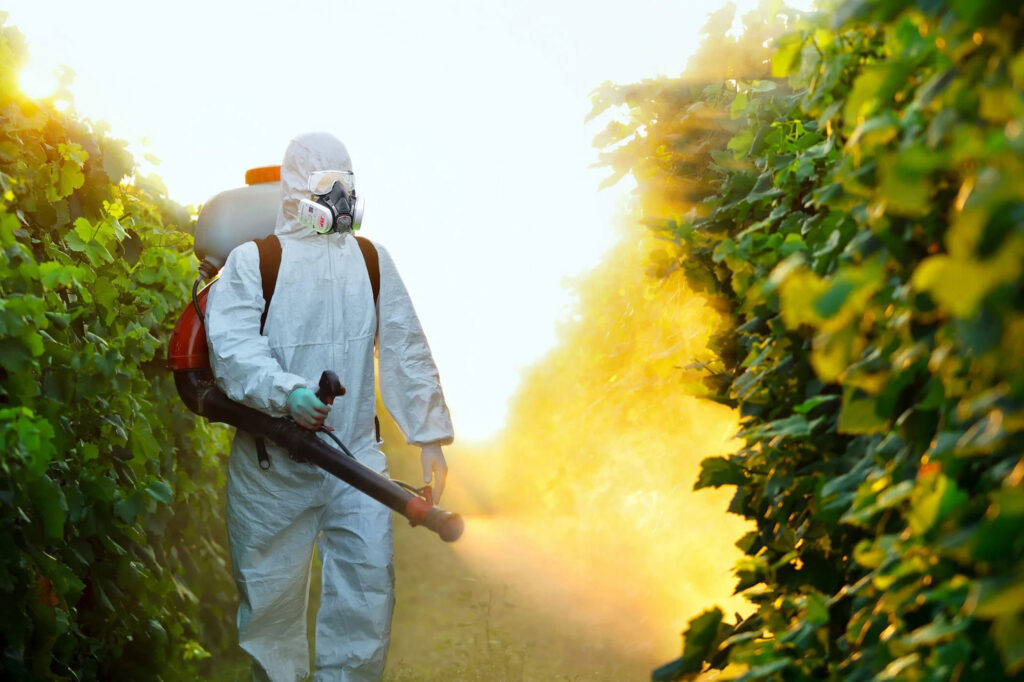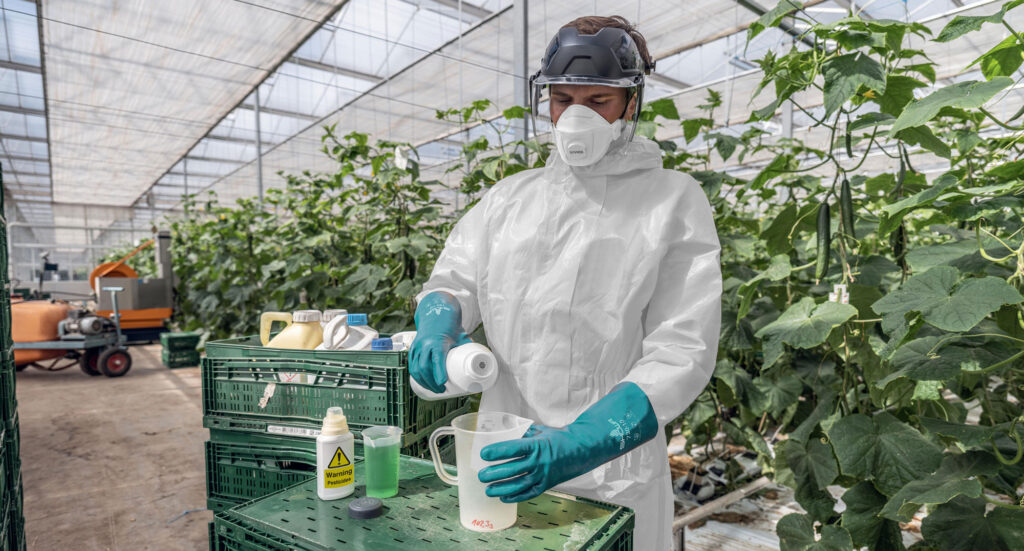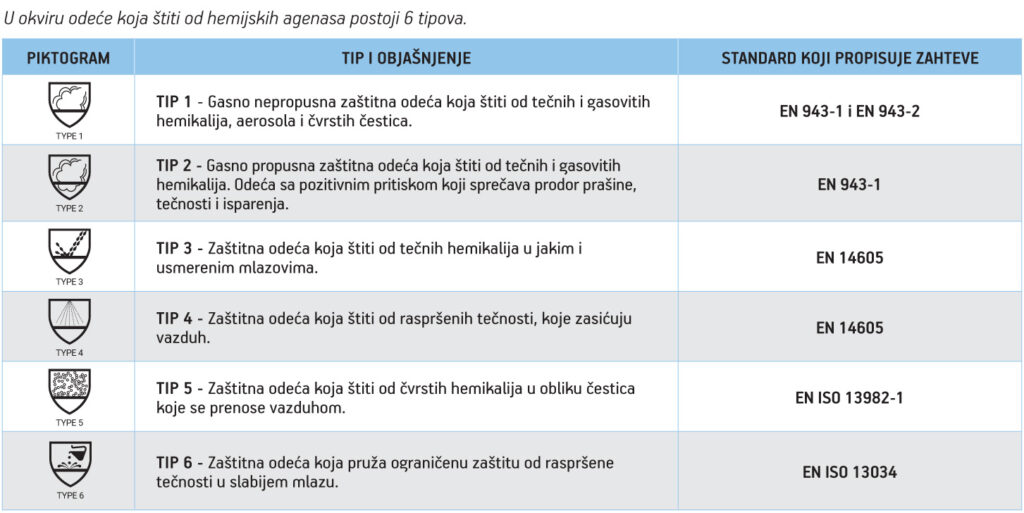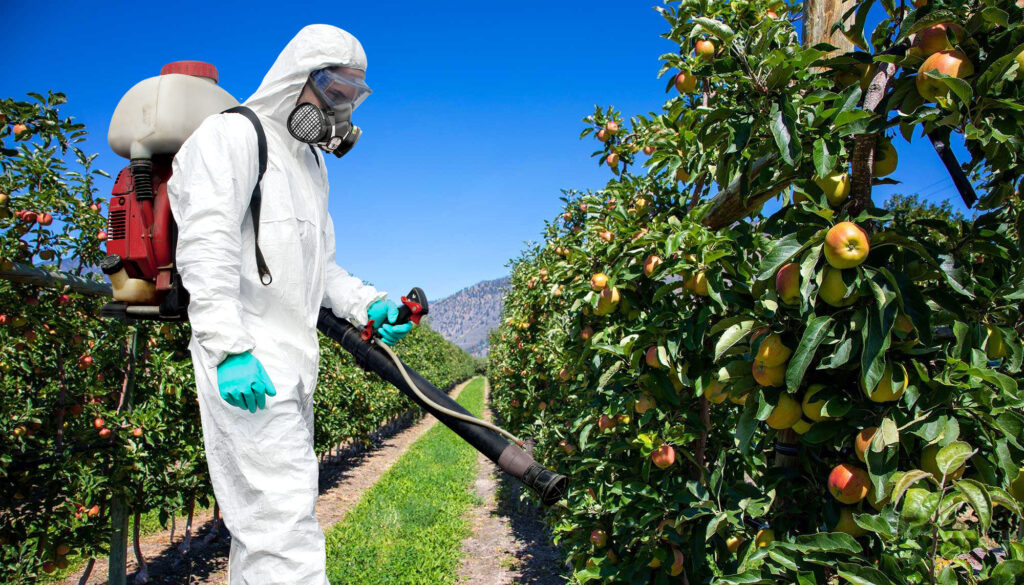Pesticides are substances of chemical or biological origin intended to control weeds, harmful insects and pests in agriculture, and their inadequate preparation and application can lead to permanent unwanted consequences for human health and its environment, and it is necessary to know how to properly handle them.
As our largest organ, the skin has a barrier function and protects the organism from external effects, and the penetration of pesticides into the human body takes place precisely through the skin and respiratory organs, so the use of personal protective equipment during the use of pesticides is mandatory.
Some pesticides produce acute toxic effects due to their corrosive or irritant properties, which can cause irritation or damage to the respiratory system, skin or eyes, and some can cause severe burns or permanent blindness.

There’s something dangerous in the air
Chemicals with harmful properties require additional attention and the use of adequate personal protective equipment
Manipulation and use of plant protection products is a daily routine for well-trained people who handle them. On the other hand, farmers periodically encounter the preparation and application of pesticides, and their knowledge about the danger of these substances is at a low level.
Contact with pesticides occurs during purchase, during use and disposal of packaging, during washing of the tractor unit for pesticide application, taking off clothes, moving around the crop…
Pesticides can enter the body through the skin, mouth, nose and eyes, and the most common case is the penetration of pesticides through the skin into the bloodstream, which can occur as a result of spraying, spillage during mixing, loading, application or disposal of pesticides.

Special attention should be paid to the use of chemical overalls, which belong to the III category of personal protective equipment and which protect the largest part of the user’s body during contact with pesticides.
They are intended for hazards that can lead to permanent damage to human health, and the use of chemical overalls that cover and protect the entire body is mandatory when in contact with pesticides and other harmful substances.
A suitable chemical coverall can be selected:
1. after identifying the aggregate state of the hazardous chemical
2. with the consultation of the security person, it is necessary to define which type of chemical coverall is needed
3. based on the time period of exposure to a certain chemical
It has six different types of protection levels, as well as standards that prescribe requirements depending on the concentration of chemical agents in the air.

Agricultural workers are obliged to follow the instructions and to select and use an adequate type of chemical coverall in accordance with the appropriate level of protection.
Also, due to the danger of spraying chemicals, droplets, impact of smaller and larger particles during the preparation and application of pesticides, it is necessary to adequately protect the eyes and use protective glasses.
It is especially important to use glasses during the processing of tall trees, when measuring and mixing products, and when fruit growers sit in tractors without a cab where they are directly exposed to the spraying of harmful chemicals.
The risks to the respiratory organs are not visible to the naked eye, and in fruit and vegetable growing, one should be careful when using pesticides whose negative effects can cause unwanted consequences if inhaled during the preparation or spraying process.
Inhalation of volatile particles and pesticide gases can cause immediate damage to the mucous membrane and lungs, and the best form of protection against aggressive chemicals and vapors is provided by half masks with replaceable filters that retain toxic substances and thus allow the user to breathe normally and safely.
Given that pesticides enter the human body in 80% of cases through the skin, it is necessary to protect the hands and use adequate protective gloves, which are a mandatory part of personal protective equipment.
Gloves must be pulled over the sleeves of the blouse so that harmful liquids do not flow and come into contact with the skin, and before removing the gloves, they must first be washed, dried, sprinkled with talcum powder and prepared for the next use.
Chemical gloves can be made of different materials such as butyl rubber, neoprene, nitrile, latex and PVC. They have a wide range of applications, and in order to choose the right glove for protection against chemicals, it is important to understand what the standard really prescribes. It is recommended to define the type of chemical or the CAS number of the chemical on the basis of which we can find an adequate glove according to the data from the CAS table. Also, even when we find an adequate glove according to the CAS number of the chemical, it is necessary to subsequently consult with the safety person before implementing it into the work process.

Agricultural work often involves moving on treated surfaces and wet terrain, and workers are exposed to the risk of coming into contact with pesticides and toxic chemicals that can enter the body through the skin.
The best choice for safe work in agriculture is rubber boots over which you need to pull on the legs of a protective suit.
A hazard is something that can cause harm, and a risk is how likely something is to hurt us

Duties of the employer in relation to personal protective equipment
• Provide operators with appropriate personal protective equipment in a clean and operational condition
• Ensure that equipment operators use PPE correctly and in accordance with the manufacturer’s instructions
• Ensure that any respirator used properly fits the operator
• Inspect all PPE before each day of use for leaks, holes, tears or worn areas and repair or discard any damaged equipment
• Provide operators with clean areas away from pesticide storage and pesticide application areas
The use of adequate equipment contributes to the successful use of pesticides in the fight against pests without the risk and fear of poisoning people and the environment.
For more than 30 years, the Albo company has taken care of the safety of users at work with an assortment that has a wide selection of personal protective equipment intended for various activities, including equipment intended for the agricultural industry and protection from pesticides, and our colleagues are always available for all consultations and additional information .







